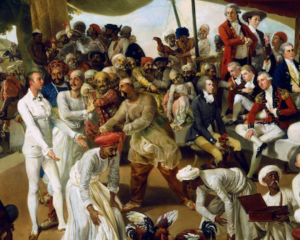Perhaps because we were so besotted with our shiny new toys, we weren't looking or listening in the right place, weren't eavesdropping in the bazaar and the mosque, listening to the imams and the soothsayers.
也许是我们过于沉迷这个新奇玩意却没有用对地方,没有去偷听集市和清真寺里的风声,没有去听阿訇和算命人的私语。
If we had been listening, we'd have heard, in the towns, angry complaints about missionaries pushing bibles in native languages,
如果我们有仔细倾听,就一定会发现,城镇里,人们纷纷抱怨传教士用当地语言宣讲圣经,
and in the countryside, protests about who controlled the land, and the taxes you had to pay for it.
在乡村里,人们发起抗议,表达对田地分配和高额税赋的不满。
Mutiny, the word by which we know the terrible slaughters of 1857, seems to speak of rank ingratitude for all the good Britain was supposed to have brought India.
暴动,概括了1857年那一场骇人听闻的屠杀,英国抱着善意的初衷想给印度带来改变,而印度人却以此诠释了他们的忘恩负义。
But if you look at it from the Indian point of view, the picture changes.
而如果从印度人的角度出发,就是另一回事了。
Both British and Indians got very worked up about loyalty and honour.
两国人民谈到忠诚和荣誉都义愤填膺。

But what they meant by those very highly-charged words were two completely different sets of values -- values which were at war with each other in 1857, before a single shot had been fired.
但他们对这两个词的定义却因价值观不同而截然不同,1857年,枪声还没有响起,这两种价值观就先爆发了冲突。
The Indians, whether Hindus or Muslims, peasants or townsmen, lived in a world governed by ceremony, shame, respect and passion.
印度人,不论是印度教信徒还是穆斯林,农民还是城里人,都生活在一个由仪式、羞耻心、尊重和激情掌控的社会。
The Victorians prized moral and material self-improvement, and above all, tight emotional discipline.
而维多利亚时代的英国人崇尚道德和物质追求,以及最为重要的,严格的情感约束。
Typical, then, that in their eagerness to issue their Indian recruits, or sepoys, the new, improved Enfield rifle,
因为急着给印度士兵发放武器,即新式升级版恩菲尔德式步枪,
the army neglected to ensure that the cartridge grease was made of neither pig nor cow fat, an oversight bound to offend both Muslims and Hindus.
英国军队往往会不小心用猪或牛脂炼出的油抹上弹药筒,这一失误必将冒犯到穆斯林和印度教信徒。
In fact, it was not the issue of the offending cartridges which was the problem. Vegetable grease was quickly substituted.
事实上,问题并不在枪支上涂抹的油。很快,植物油就取而代之。
What was most offensive was the increasingly arrogant response of the British to matters which they regarded as trivial.
真正最冒犯当地群众的是英国人对那些他们所认为的琐事采取越发傲慢的回应。
They were about to find out just what was trivial to an Indian and what wasn't.
很快,他们就会知道对印度人来说,什么是琐事,什么是大事。













